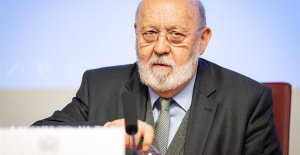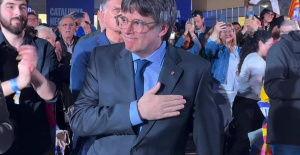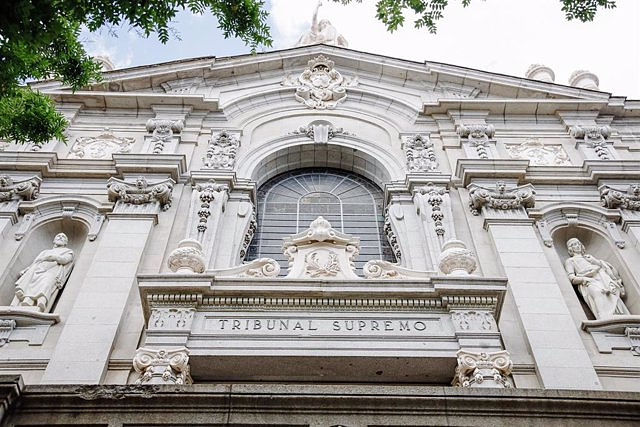Confirms the sentence to 24 and a half years in prison against Iratxe Sorzábal for two attacks in Gijón in 1996
MADRID, 2 Feb. (EUROPA PRESS) -
The Supreme Court (TS) has endorsed the ruling of the National Court (AN) by which it sentenced the ETA member Iratxe Sorzábal to 24 and a half years in prison for terrorist havoc for two attacks committed in Gijón in 1996, claiming the value of the judicial investigations that ruled out that he had confessed to police torture in response to the complaints he filed for these alleged ill-treatment before the Council of Europe and Amnesty International.
In a judgment dated January 25, to which Europa Press has had access, the Supreme Court has rejected the appeal filed by Sorzábal, who sought to revoke her sentence, alleging that "after being detained incommunicado by The Civil Guard was forced, based on ill-treatment and torture, to testify against their will twice at police stations".
According to the defense, whose account is collected by the Criminal Court of the Supreme Court, "once the arrest at the police station ended, and already in court, but still in a period of incommunicado and without being able to have a defense lawyer of his choice, he denied the statements police officers and denounced torture".
"After being imprisoned, she wrote a note to her organization, where in two distinct parts, on the one hand, she told ETA what the Civil Guard made her declare at the police station and, on the other hand, she recounted the hell she lived through those five days," says the high court.
The ruling, a presentation by magistrate Manuel Marchena, recalls that "the National Court has ruled out the existence of torture based on a report from the forensic doctor", which was later expanded, and that the alleged ill-treatment was investigated in an Investigating Court of Madrid that ended up filing the case, a decision that was confirmed by the Provincial Court.
Faced with this, the defense wields two reports: "one from the Committee for the Prevention of Torture and Inhuman or Degrading Treatment or Punishment (CPT) of the Council of Europe, which made an emergency visit to Spain and met with eight people who had been subjected to mistreatment and torture, including the appellant"; and another from Amnesty International.
"By letter dated September 29, 2017, the Committee confirmed that it had met with the defendant during her July 2001 visit to Spain and indicated in its report that it had gathered evidence --including medical evidence-- consistent with the allegations of ill-treatment", while "in a similar line, Amnesty International considered that torture accredited", states the Supreme Court.
The magistrates highlighted "the important mission assumed by the CPT of the Council of Europe", adding that "the relevant role that Amnesty International has been playing is not questionable", while stating that "the simple allegation of torture as a result of a police arrest must notify the court called to investigate or prosecute the facts denounced".
"The use of such serious practices that violate human dignity makes it necessary to activate as many investigative means as are necessary to exclude any suspicion regarding the respect for the freedom and dignity of the citizen guarded in police stations," they maintain, being aware that "the Investigation procedures carried out in violation of fundamental rights generate a metastatic effect that can irreversibly contaminate the rest of the probative material".
However, they show that in this case the complaint about alleged torture formulated by Sorzábal "did not respond to institutional indifference when it came to clarifying the facts denounced", but rather that an in-depth investigation was carried out to end up ruling out the alleged ill-treatment.
In this context, the Supreme Court explains that, despite the value that the reports of the Council of Europe and Amnesty International may have, an "uncritical acceptance" of them "is incompatible with the very meaning of the judicial function."
"The proposal to replace what is reasoned in a report signed by a body of that nature with what is valued in a sentence handed down by a court cannot be accepted normally," says the Second Chamber.
In this sense, it indicates that "a report made from visits and interviews with people who contact those entities can never be equated to a process in which acts of evidence are carried out filtered by the principle of contradiction and the right of defense" .
"Asserting the existence of medical evidence -as the CPT report does- that would give consistency to the allegations of ill-treatment supposes altering the predicable nature of those reports and, what is more serious, subverting the field of knowledge that any system democracy reserves to the Judges and Tribunals", he says.
Despite this, it stresses that "telling officials of a Council of Europe committee or representatives of a non-governmental organization that they have been the victim of torture, brutality or inhuman treatment is of vital importance not only to prevent their impunity, but to intensify the democratic controls in any society that is indifferent to these complaints or does not rigorously prosecute attacks on the dignity of the complainant".
But it stresses that, once "a jurisdictional process is activated in which the complaint of torture can be a determinant of its outcome, the report, which has already played its invaluable role, has to cede its space to the probative activity carried out by the parties ". "And that is what has happened in the present case," he settles.
The Supreme Court also rejects the request of Sorzábal's defense that the so-called 'Atristain doctrine' be applied to him, according to which the solitary confinement of this other ETA member was legal but "of an overly general nature", for which the Court European Court of Human Rights (TEHD) declared that Spain violated his rights to a fair trial and to choose a lawyer, and ordered him to be compensated with 20,000 euros.
The high court observes a "lack of similarity" between the two cases. Thus, he reasons that in the case of Atristain "the main source of evidence that the National Court assessed to support the conviction was, precisely, the statement obtained by the agents while incommunicado."
"However, in the case that is the subject of this appeal, the National Court has not assessed this incriminating statement, but the autograph document signed by the defendant herself, together with other evidence offered by the witnesses and physicians who testified in the plenary", complete.

 Exploring Cardano: Inner Workings and Advantages of this Cryptocurrency
Exploring Cardano: Inner Workings and Advantages of this Cryptocurrency Seville.- Economy.- Innova.- STSA inaugurates its new painting and sealing hangar in San Pablo, for 18 million
Seville.- Economy.- Innova.- STSA inaugurates its new painting and sealing hangar in San Pablo, for 18 million Innova.- More than 300 volunteers join the Andalucía Compromiso Digital network in one month to facilitate access to ICT
Innova.- More than 300 volunteers join the Andalucía Compromiso Digital network in one month to facilitate access to ICT Innova.-AMP.- Ayesa acquires 51% of Sadiel, which will create new technological engineering products and expand markets
Innova.-AMP.- Ayesa acquires 51% of Sadiel, which will create new technological engineering products and expand markets Marc Márquez returns to pole in Jerez
Marc Márquez returns to pole in Jerez The CIS carries out a quick survey on Sánchez's letter to measure the reaction of citizens
The CIS carries out a quick survey on Sánchez's letter to measure the reaction of citizens 12M.- Puigdemont to Sánchez and Illa: "This is not about the future of the PSOE! What have you believed?"
12M.- Puigdemont to Sánchez and Illa: "This is not about the future of the PSOE! What have you believed?" Díaz proclaims that "the Government is not going to bow down" and asks not to be "on the defensive and locked in" against the right
Díaz proclaims that "the Government is not going to bow down" and asks not to be "on the defensive and locked in" against the right How Blockchain in being used to shape the future
How Blockchain in being used to shape the future Not just BTC and ETH: Here Are Some More Interesting Coins Worth Focusing on
Not just BTC and ETH: Here Are Some More Interesting Coins Worth Focusing on UPV students build a prototype of a wooden house to move to Equatorial Guinea
UPV students build a prototype of a wooden house to move to Equatorial Guinea The UA opens the call for the Impulso 2024 Awards for the best innovative business initiatives
The UA opens the call for the Impulso 2024 Awards for the best innovative business initiatives ALI, virtual assistant from Alicante, internationally recognized by the OECD
ALI, virtual assistant from Alicante, internationally recognized by the OECD Retrópolis brings the golden age of video games and computing to the UPV
Retrópolis brings the golden age of video games and computing to the UPV A million people demonstrate in France against Macron's pension reform
A million people demonstrate in France against Macron's pension reform Russia launches several missiles against "critical infrastructure" in the city of Zaporizhia
Russia launches several missiles against "critical infrastructure" in the city of Zaporizhia A "procession" remembers the dead of the Calabria shipwreck as bodies continue to wash up on the shore
A "procession" remembers the dead of the Calabria shipwreck as bodies continue to wash up on the shore Prison sentences handed down for three prominent Hong Kong pro-democracy activists
Prison sentences handed down for three prominent Hong Kong pro-democracy activists ETH continues to leave trading platforms, Ethereum balance on exchanges lowest in 3 years
ETH continues to leave trading platforms, Ethereum balance on exchanges lowest in 3 years Investors invest $450 million in Consensys, Ethereum incubator now valued at $7 billion
Investors invest $450 million in Consensys, Ethereum incubator now valued at $7 billion Alchemy Integrates Ethereum L2 Product Starknet to Enhance Web3 Scalability at a Price 100x Lower Than L1 Fees
Alchemy Integrates Ethereum L2 Product Starknet to Enhance Web3 Scalability at a Price 100x Lower Than L1 Fees Mining Report: Bitcoin's Electricity Consumption Declines by 25% in Q1 2022
Mining Report: Bitcoin's Electricity Consumption Declines by 25% in Q1 2022 Oil-to-Bitcoin Mining Firm Crusoe Energy Systems Raised $505 Million
Oil-to-Bitcoin Mining Firm Crusoe Energy Systems Raised $505 Million Microbt reveals the latest Bitcoin mining rigs -- Machines produce up to 126 TH/s with custom 5nm chip design
Microbt reveals the latest Bitcoin mining rigs -- Machines produce up to 126 TH/s with custom 5nm chip design Bitcoin's Mining Difficulty Hits a Lifetime High, With More Than 90% of BTC Supply Issued
Bitcoin's Mining Difficulty Hits a Lifetime High, With More Than 90% of BTC Supply Issued The Biggest Movers are Near, EOS, and RUNE during Friday's Selloff
The Biggest Movers are Near, EOS, and RUNE during Friday's Selloff Global Markets Spooked by a Hawkish Fed and Covid, Stocks and Crypto Gain After Musk Buys Twitter
Global Markets Spooked by a Hawkish Fed and Covid, Stocks and Crypto Gain After Musk Buys Twitter Bitso to offset carbon emissions from the Trading Platform's ERC20, ETH, and BTC Transactions
Bitso to offset carbon emissions from the Trading Platform's ERC20, ETH, and BTC Transactions Draftkings Announces 2022 College Hoops NFT Selection for March Madness
Draftkings Announces 2022 College Hoops NFT Selection for March Madness























